Kyrgyz Republic
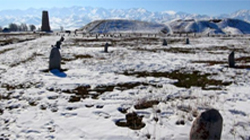
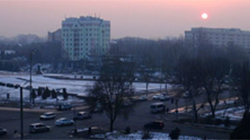


1. Activities (2010- )
| Month/ Year | Places (Prefecture, etc.) | Activities |
| 2024/11/26 | Tsukuba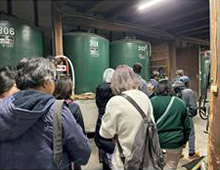 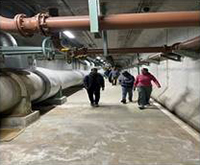 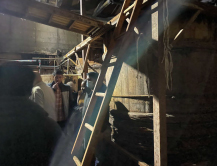 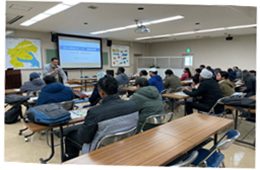 |
The participants visited a water treatment plant, a sake brewery, and a soy sauce brewery in the Kasumigaura Lake region to explore the potential of biotechnology in advancing a sustainable society. During the internship, they learned how biological processes are applied and managed. They also gained insight into agrotourism by studying the rich history of sake and soy sauce fermentation, discovering how these traditions are deeply intertwined with Japanese culture and Have contributed to the local community. |
| 2024/08/10-08/14 | Shanghai (China)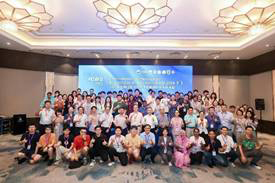 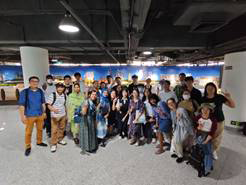 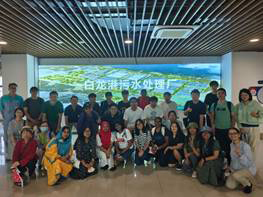 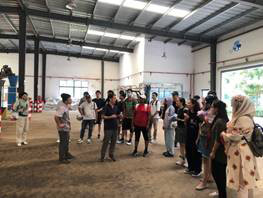 |
From August 10 to 11, the students attended the International Conference on Bioprocess and Sustainability 2024 (ICBS2024) organized by Shanghai Academy of Environmental Sciences, Tongji University, Shanghai University, Tsinghua University, Nankai University, Hainan University and University of Tsukuba. In this conference the students had a good communication with the 18 invited professors and about 300 participants on the advancements of biological processes and their contributions to sustainable development goals (SDGs). In the following three days, the students firstly visited Shanghai Mengqing Theme Park where they acquired the history of water pollution, sewage collection, and management in Shanghai. During the visit to Shanghai Bailonggang Wastewater Treatment Plant (WWTP), the largest WWTP in Asia, the students learned how this largest WWTP treats about one-third of the sewage and sludge produced in Shanghai and gradually improves its sustainability. In Shanghai Qingpu Agricultural Park, they deeply understood how the local farmers environmentally friendly manage their farmland including irrigation system and agricultural wastes with improved crop productivity and quality in the context of SDGs. |
| 2024/07/30-08/01 | Tohoku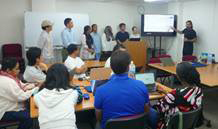 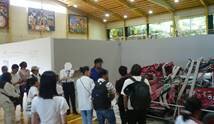 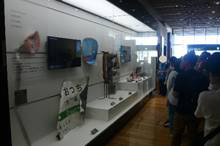 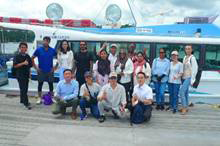 |
The participants visited disaster remains and museums in Miyagi and Iwate Prefectures to learn about the actual damage caused by the earthquake and tsunami of the Great East Japan Earthquake. The participants visited the Matsushima Coast and learned about the importance of tourism resources in the recovery process. Furthermore, they learned about the differences in disaster prevention efforts among various countries. |
| 2024/02/26 | Saitama & Tochigi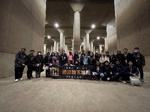 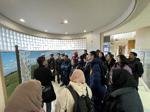 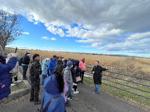 |
The participants visited the Metropolitan Area Outer Discharge Channel, which is designed to reduce flood disasters in the upstream areas from the Edo River to the Tone River. They collected information and exchanged views about its functions, effectiveness and costs about this world’s largest underground flood management facility. They also visited Watase Artificial Wetland, a Ramsar site, to gather information and exchange views about flood control, water supply, history of copper poisoning incident, wetland ecosystem and the role of annual controlled burning practices. |
| 2024/02/19-02/22 | Taiwan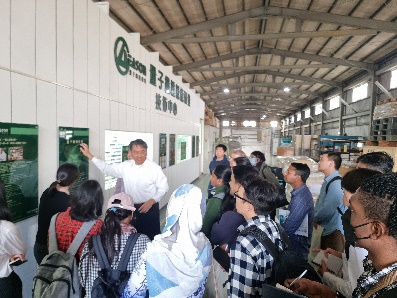 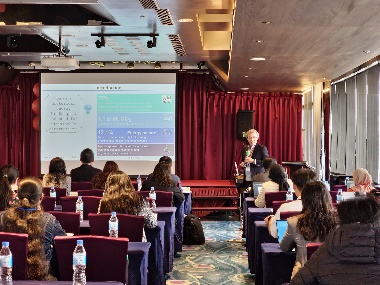 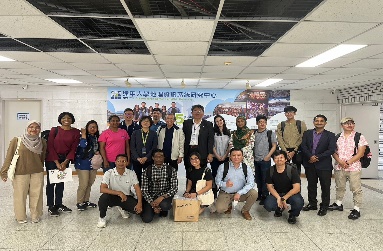 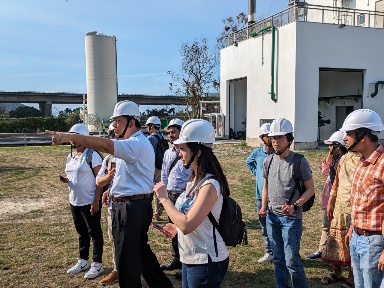 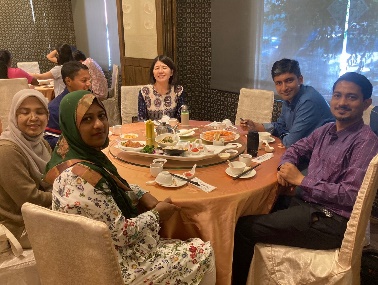 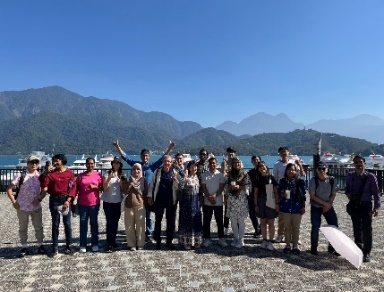 |
The filed study promoted international exchanges for r different disciplines, especially integrated solid waste management, material science, technology innovation for small island economy, and ways to meet sustainable development goals through the collaboration of industry, educational institutions, and local community members. Participants learned from different green technology institutes at Feng Chai University especially related to bioplastics and GIS. They also learned about international platform for biotechnology professionals to share technologies and research achievements through collaboration to develop relevant technologies in the bioenergy sector. |
| 2024/01/31 | Tokyo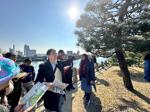 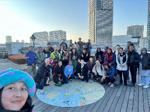 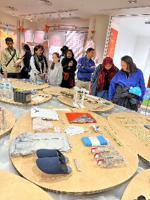 |
The participants visited areas in and around Tokyo to learn about flood and disaster preparedness and exchange views. In Tokyo, the participants gathered information about super levees along the Sumida River and the disaster prevention measures. Shioiri Park is located on the super levee that is designed for the evacuation site with emergency camp sites. They also visited Tokyo Rinkai Disaster Prevention Park in Tokyo Bay to experience disaster measures within 72 hours. Regarding private sector disaster management measure, they observed newly established Azabudai Hills. |
| 2023/12/02, 12/8 | TSUKUBA, Research Institute 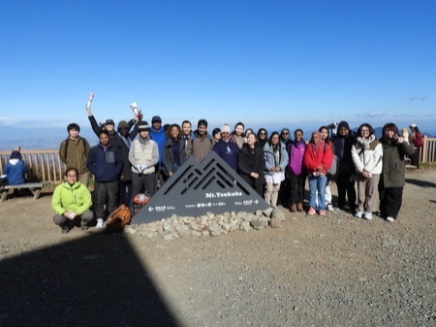 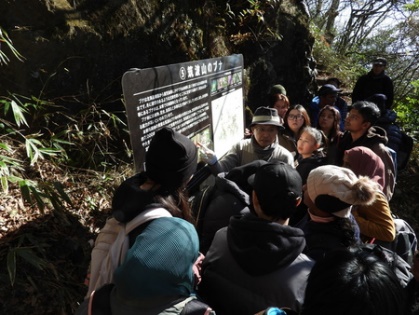 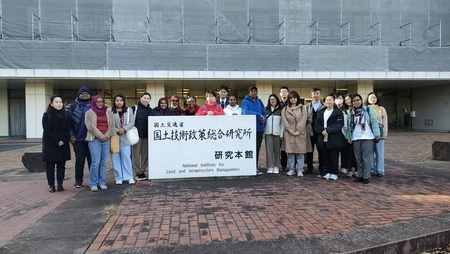 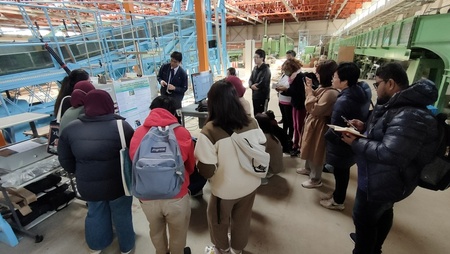 |
Tsukuba and received on-site explanations from Dr. Tanaka, an expert on the impact of climate change on beech forests in the area (2 Dec). At the National Institute for Land and Infrastructure Management (NILIM), the participants received training on sediment disasters and their countermeasures from Dr. Yamakoshi Director of the Erosion Control Research Office, and toured the experimental facilities. ibid. (8 Dec.). This enabled us to comprehensively enhance our knowledge on climate change issues from three perspectives: forecasting, natural effects (ecosystems) and social effects (disasters). |
| 2023/02/11-02/18 | Kansai (Kyoto・Osaka・Kobe)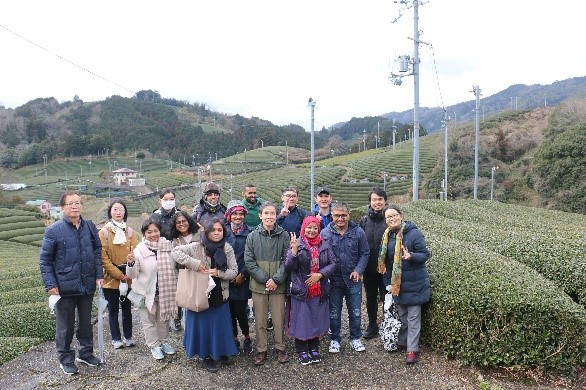 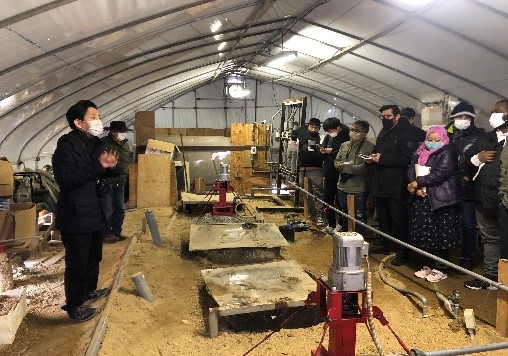 |
From February 11 to 18, 2023, the participants attended lectures by three researchers from Kyoto University and Kobe University, and learned academic and practical knowledge on water environment management, wastewater/waste treatment and resource recovery and biomass energy production, organic and smart agriculture through visits to Lake Biwa Museum, Yagi Bioecology Center, Wazuka Town, Kyoto University Graduate School of Agriculture Farm, Lake Biwa/Yodo River Water Quality Conservation Organization, Kobe City Higashinada Treatment Plant and Yuge Farm. Through visits to the Kyoto Graduate School of Agriculture farm, the Lake Biwa-Yodo Water Quality Conservation Organization, the Kobe Higashinada Treatment Plant, and the Yumigake Farm, participants acquired academic and practical knowledge about water environment management, wastewater/waste treatment/resource recovery and biomass energy production, organic farming and smart farming. Finally, through group work and presentations, students gained a deeper understanding of sustainable water environment management, agriculture, and environmental conservation. |
| 2023/01/31-02/03 | Amamiohsima (Kagoshima) 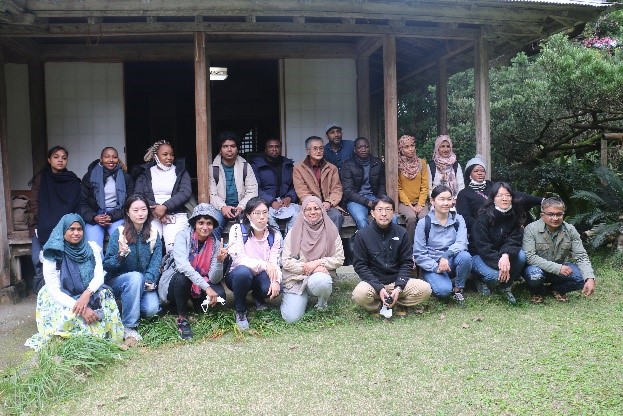 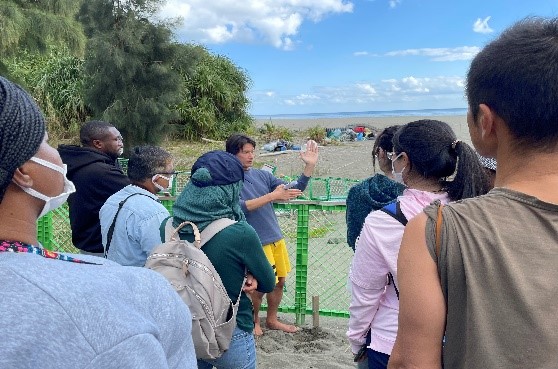 |
The JDS students visited Amami Oshima Island, which will be registered as a World Heritage site in 2021, to gather information and exchange views on the conflict between biodiversity conservation and regional development, the ideal form of ecotourism, future utilization of World Heritage natural resources, and disaster prevention measures in the region. The JDS students first learned about endangered and invasive species on Amami Oshima from local experts. Based on this, they participated in ecotourism through a certification program for guides. At the same time, they learned how to sustain the nature conservation required by the World Heritage registration from the construction administration-oriented economy that has continued for many years since the end of World War II. Furthermore, they gained the ability to analyze how disaster prevention measures due to global warming and typhoons are related to the sustainability of the local economy and environment. |
| 2023/01/25 | Kasaikaihin park・Tokyominatorie・Asakusa・Shioiri park (Tokyo) 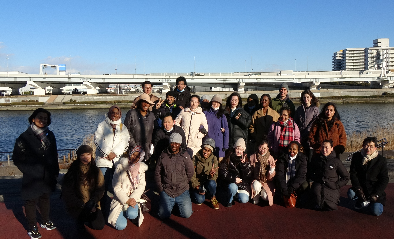 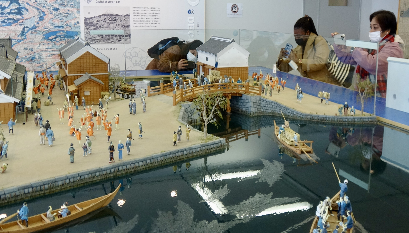 |
In this activity, the group visited a Ramsar site in Tokyo to observe species conservation and public access. They also visited a museum to obtain an overall picture of the history of Tokyo's bayfront development and disaster prevention. Furthermore, to learn about the Tokyo Metropolitan Government's disaster prevention activities in the Sumida River basin, they visited super levees, bridges, and disaster prevention equipment to gather information and exchange views on countermeasures against urban disasters. This enabled the JDS students to examine the future of disaster prevention measures in their own countries by comparing them with examples from their own countries. |
| 2022/12/07-12/09 | Kitakyusyu (Hukuoka) 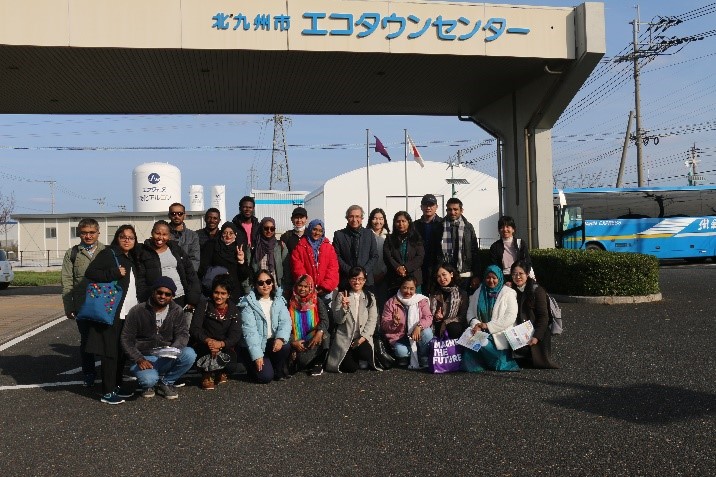 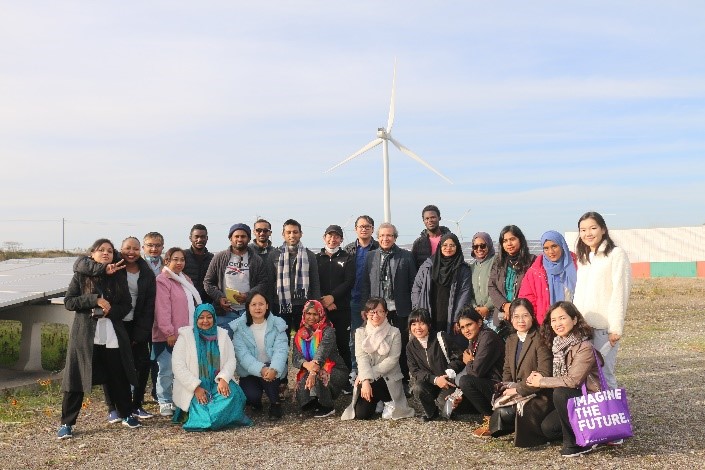 |
During this field study, we visited Kitakyushu Eco-Town and learned about the importance of cooperation between industry, government, and the city. Here, the students learned about recycling technologies for plastic bottles and e-waste. They also learned about wind and solar power generation systems in the Eco-Town complex. They also visited Yamaguchi Dairy's biogas plant, which produces biogas from by-products and waste from the dairy industry and uses it as an energy source for the industry. Finally, the students visited an incineration and resource recovery facility in Shimonoseki City. The students were able to understand the importance of having a life cycle thinking about resource management. |
| 2022/12/06 | Metropolitan Area Outer Discharge Channel (Saitama) and Watarase Wetland (Tochigi)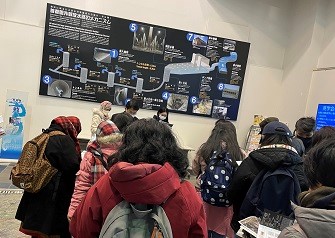 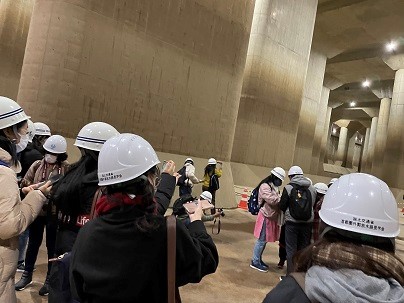 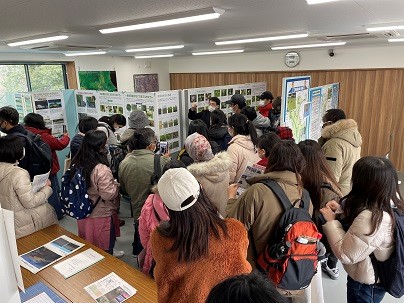 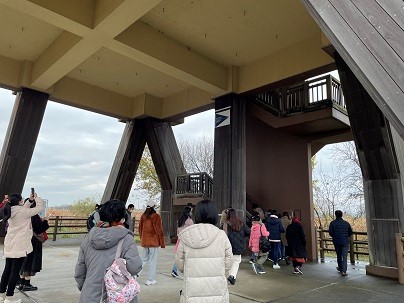 |
The participants visited the Metropolitan Area Outer Discharge Channel in Saitama Prefecture and Watarase Wetland in border areas of Tochigi, Ibaraki, Gunma, and Saitama prefectures. This training focused on flood control and wetland management in the Kanto region. At the Outer Discharge Channel, the JDS students visited the world's largest underground flood control facility, which is designed to reduce rising water levels in four surrounding rivers. Guided tour gave them detailed information about this facility and its functions. This allowed the JDS students to gather information and exchange opinions on the possibility of organized infrastructure development. At Watarase Wetland, the students learned about the reservoir's role in controlling flooding of the Watarase River, which flows around Furukawa City, to improve water quality, provide water for agriculture and domestic use, and conserve wetlands and birds under the Ramsar Convention. They also gathered information on the damage caused by the 2019 typhoon. In addition, the site's former Yanaka Village was the site of eviction during the Ashio Mine Poisoning Incident at the beginning of the 20th century, allowing the group to gather information and exchange views on the pollution movement in Japan. |
| 2022/11/22 | Yokota farm (Ibaraki)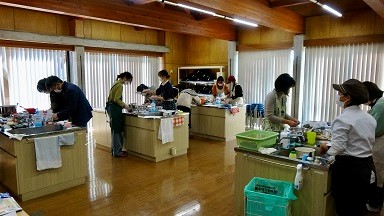 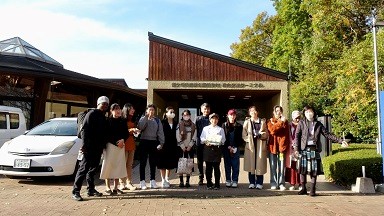 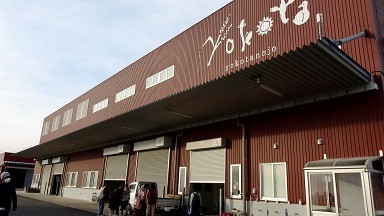 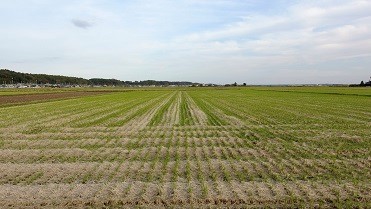 |
The training on food and agriculture was conducted at Yokota Farm. This smallholder business has cultivated rice in Ibaraki Prefecture for several hundred years. After being incorporated as business entity about ten years ago, Yokota Farm has received Emperor's Award and the Minister of Agriculture, Forestry, and Fisheries Award for its good example in small-scale farming businesses. JDS Fellows visited the farm and collected information from Mr Yokota and his wife on farm management, value chain, food education, measures for abandoned land, and agricultural tourism. They were also able to gather information and exchange opinions on methods of preserving and sorting harvested rice, mechanization, and cost reduction. |
| 2022/09/14-09/16 | Osaki Town (Kagoshima)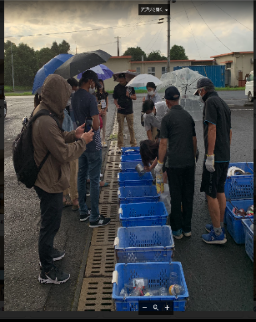 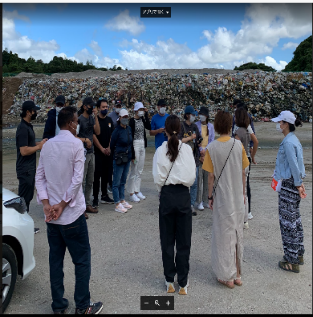 |
The participants visited Osaki Town in Kagoshima Prefecture to learn about the formation of a recycle-oriented society. It developed a “Osaki System,” in which general waste materials are thoroughly separated, sorted and recycled. The tour included lectures and discussions by Osaki Town environmental officials (including a JICA-supported project for horizontal deployment in Indonesia) and tours of various facilities (final disposal landfill, recycling facility, general waste incineration facility, and resource waste base collection). The participants also learned about town’s policies to promote youth immigration as part of regional revitalization and regional exchange through recycling. On the final day, the participants made presentations on the challenges and strengths of promoting resource recycling in their home countries under the theme of the applicability of the Osaki system to their home countries, and received advice from Osaki Town officials. |
| 2022/09/06-09/08 | Ryukyu University (Okinawa)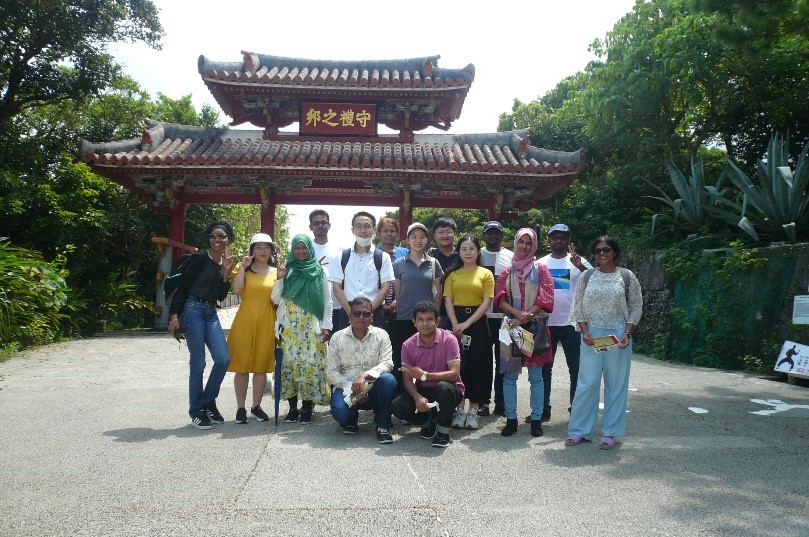 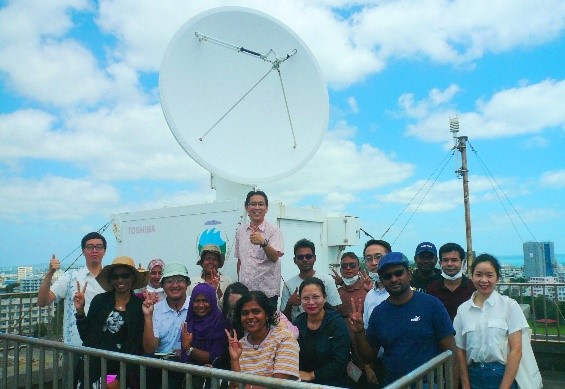 |
The Participants listened to lectures on tropical storms and meteorology by two researchers from Ryukyu University. They visited the Fujukan Museum on the Ryukyu University campus and learned about the relationship between natural disasters and ecosystems. They acquired information about the industry and tourism in the Okinawa Islands through a tour of Shurijo Castle. Based on what they learned, they engaged in group work and deepened their understanding of sustainable development and environmental conservation through presentations and discussions. |
| 2022/08/28-08/31 | Kushiro (Hokkaido)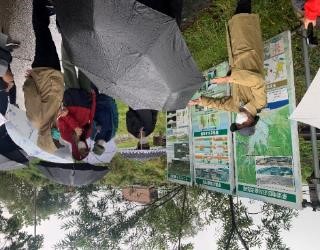 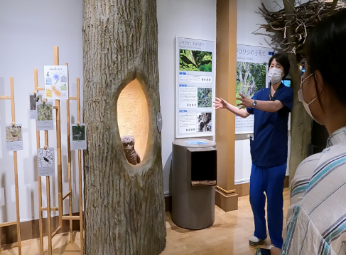 |
The participants visited the Kushiro Wetland area in Hokkaido to deepen their understanding about marshland ecosystem services, conservation of red-crowned cranes (a national protected species) and rare plants and animals, ecosystem conservation measures through the Old River Restoration Project, and eco-tourism promotion by visiting facilities (Akan International Crane Center, Wildlife Conservation Center, and Kushiro Construction Department of MLIT) and relevant areas. On the last day, the participants presented about the conservation of the Kushiro Marsh ecosystem and lessons learned for environmental conservation, disaster prevention, and industrial promotion in comparison to their home countries. They received advice on their presentations from experts. |
| November/2019 | Kita-Kyushu/Yamaguchi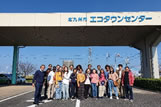 |
This domestic field trip gave our students the opportunity to grasp the latest technological innovations in material recycling and energy recovery efforts in Japan. In Kitakyushu Eco-Town students learned about the integrated recycling complex in the Eco-Town Center and then had the practical visits to the PET bottles and cans recycling facilities. In Yamaguchi Kenraku milk factory the students learned about the fermentation of its organic wastes and by products to produce biogas that is subsequently used to produce steam. The steam is then used as energy input into the milk industry. We also visited Shimonoseki incineration facility and material recovery facility where students strengthened their knowledge about integrated waste management. Finally in Sanyo recycling facility the students could learn about the recycling of fish residue. |
| September/2019 | The Netherlands/Germany |
This field trip aimed to enhance JDS Fellows’ knowledge and insights about agricultural practices, disaster management, and water governance in the Netherlands and Germany. In Amsterdam, the Fellows observed water canals that are important part of city planning and economic development. In Haarlem, the Curuquius museum showed the historic water drainage practices. In Delft, the Fellows observed water drainage practices and dairy farms in polders. They also had seminars with graduate students at the Delft University of Technology. The Fellows then visited the unique storm surge barrier called Maeslantkering at the mouth of the Rhine River (picture) to understand the Delta Work of the Netherlands and the importance of flood protection for the economy. The Fellows then visited Rotterdam to observe the environmental restoration of former development sites and floating forests. They presented about their research topics at the Rotterdam University of Science and Technology and interacted with undergraduate students there. In Germany, the Fellows had a seminar and a short tour about flood management and water governance at the Rhine and the Rhine Commission in Koblenz. Then they went downstream to Cologne for more flood protection practices. |
| August/2019 | Kushiro(Hokkaido) |
Participants visited the Kushiro Wetland National Park area, Hokkaido, the first and largest Ramsar site in Japan, to learn sustainable management of the wetland through wise use of natural resources and ecosystem services in tourism, fisheries and so on. Guided by Mr. Hisashi Shinsho, Chair of Kushiro International Wetland Centre Technical Committee, the participants experienced an adventurous wetland walk, trail walk and river canoeing to learn the unique ecosystems including groundwater flow and the meandering river restoration project in Kushiro Wetland. They also learned about local efforts to wise-use natural resources through discussion with Mr. Takeshi Tosa who is a local fisherman, ecotourism operator and devoted conservation practitioner, conservation research and practice of red crown cranes at Akan International Crane Center and rehabilitation and conservation activities for the local endangered raptor species at Institute for Raptor Biomedicine Japan. |
| August/2019 | Okinawa |
Students visited University of the Ryukyus and attended lectures on tropical cyclone observations, forecast, and disaster prevention. Students also had a short campus tour including a meteorological radar system and university museum. On the following day, the students visited Shurijo Castle Park to learn historical background on the Ryukyus with cultural communications with China and surrounding countries. |
| June/2019 | China |
This international internship guided the students to study the practices of lake water quality management in Yunnan Province, China. Through this internship, the participants got the first-hand information about the tremendous changes in urban and rural areas in China, especially in Yunnan Province. Being supported by Yunnan University, the students firstly participated in the joint seminar entitled “Pollution Control in Rural Area and Innovative Application of Biomass Energy”. Five students presented their research works and well communicated with Chinese professors and students. During the following days, they visited three lakes at different pollution levels including Fuxian Lake, Xingyun Lake and Yilong Lake, and experienced the changes of the local environment and living conditions of the local people. They also surveyed one village-scale wastewater treatment plant and two national wetland parks where different types of technologies are combined to serve for protecting lake water quality. In addition, the participants paid visits to four historic places such as 17-Hole Bridge and Tuanshan Historic Village, widening their knowledge and understanding of the balance between economic development and environmental protection. This internship not only provided a good chance for the participants to understand the environment and sustainable development, but also help them to seek efficient solutions for lake pollution issues. |
| January/2019 | Kushiro(Hokkaido) |
With sustainable management of Kushiro Wetland as a core topic, students learned about conservation and utilization of natural resources for economy and tourism, river restoration, and endangered wildlife conservation in the Kushiro Wetland area through site visits, lectures and discussion by local experts. |
| November/2018 | Malaysia |
Students participated in the 10th Better Air Quality Conference 2018 (International Conference on Air Quality Improvement) in Kuching, Malaysia. Students learned about the current state of atmospheric environmental problems in developing countries, mainly in the Asian region, and the concepts and efforts concerning air quality management technology and policies. In addition to gaining knowledge listening to lectures and presentations by experts, the students nurtured their problem recognition ability and international communication ability through communicating with the participants at the conference sessions. |
| September/2018 | Okinawa |
This field trip is designed to examine the challenges and possibilities of developments in Okinawa. This area has been one of the most popular tourism destinations in Japan with rich cultural, environmental, and historical heritages. FOCUS: (1) the conservation of local ecology and marine ecology; (2) a historical study about the establishment of Ryukyu culture and impact of World War II on the local environment and economy; (3) historical roots of Japanese-Okinawan relations; and (4) possibilities of future tourism in remote areas |
| July/2018 | Liverpool(UK) |
Visit Liverpool, UK, learn about Mercy River campaign, the pioneering environmental symbiosis city policy in the world. Students learned about water management policy and urban development centering on rivers and considered policy application to their country while comparing their case. |
| May/2018 | China | This international internship to China consisted of three parts. (1) Beijing internship: Field trip to Xiaojiahe Wastewater Treatment Plant (Beijing) and the China-Japan Joint Seminar on Water Environment Technology in Tsinghua University. (2) Tianjin internship: Field trip to the Sino-Singapore Tianjin Eco-city and the Symposium on Technological Innovations in Environmental Control and Resources Recovery & Utilization in Nankai University, Tianjin. The two field trips are related with environmental issues and applicable technologies in China, through which the students can know how people are trying their best to make their surroundings more beautiful and sustainable. During the seminars, the students had good chance to communicate with the young generation of scientists and specialists who are contributing themselves to environmental protection and sustainable development in China. (3) 2018 International Students Conference on Environment and Sustainability (ISCES) hosted by the UNEP and Tongji University. The students were offered great opportunities to exchange ideas on the environment and sustainability regarding plastic wastes with fellow students from more than 30 countries. The students also actively participated in the intensive lectures, group discussions, field trips to rural and urban areas, and poster competitions. |
| February/2018 | Mito (Ibaraki) |
A tour of Lake Senba in Mito city. Mito city is focusing on the conservation of the historical landscape and is also working on the lake environment of Lake Senba, which was originally used as agricultural water. In addition students had explanation about the city's efforts and water purification facilities that do not impair the historical landscape. |
| February/2018 | Tsukuba (Ibaraki) | Students visited the Center for Genetic Resources, Gene Databank and Agricultural Environment Change Research Center in the Agricultural Research Organization, and learned the latest knowledge on genetic resource recording, preservation technology and soil carbon storage research through lectures and facilities tours. |
| January/2018 | Tokyo | This year JDS students together with 6 professors joined this domestic trip which mainly consisted two activities: (1)visiting to the National Museum of Emerging Science and Innovation; and (2)surverying the Tokyo bay, especially Odaiba, Hinode, and Asakusa areas. All the participants experienced the advancement of technologies for environmental managemnet in Japan, especially on surface water systems and waste disposal, which is beneficial for the students to obtain the real ideas of betterment of the environment. |
| December/2017 | Kita-Kyushu/Yamaguchi | This trip gave students to learn about the importance of industry-government-city collaboration regarding environmental management. In the visit to Kitakyushu Eco Town we learned about the technologies to recycle PET bottles and Al and Steel cans. We also visited Yumoto biomass boiler that supplies hot water to a hotel by using only wood chips as fuel. We had the opportunity to visit Yamaguchi Dairy industry biogas plant. This plant uses the byproducts and wastes from the dairy industry combined with sludge form the local wastewater treatment plant and produces biogas that is used as a source of energy in the dairy industry. Finally we visited a food waste recycling plant u\in Ube city. The plant uses the food wastes from super markets, convenience stores, hotels, etc to produce animal feed. From these field studies students understood the importance of having a life cycle thinking regarding resource management. |
| August/2017 | Mongolia | This international internship mainly consisted of three activities. (1)Paid a visit to the rural area of Ulaanbaatar where the participants acknowledged the history of Monoglia and her development issues. (2)Parcipated in a seminar co-organized by the Ulaanbaatar City Government and University of Tsukuba, in which all the partipants presented their research works and findings. Through this seminar, the participants well communicated with the local government officials who are expecting to learn and contribute more to the development of Ulaanbaatar. (3)Visited the central wastewater treatment plant and sampled the typical sludges which were further used for identification of the efficient bacterial species. During this internship, the participants also visited one solar energy demonstration building where the participants exchanged ideas with the local officials who are in charge of this system. This internship can help the participants understand more about Mongolia and its environmental problems. |
| March/2017 | Ibaraki | JDS Fellows and SUSTEP students visited Shimizu Farm and learn about small/medium sized farm management, soil production, and larger agricultural concepts from Mr Shimizu. |
| January/2017 | Okinawa | JDS Fellows and SUSTEP students learned about desalination technologies, wetland conservation, coastal development and historical conflicts. |
| January/2017 | Tokyo | JDS Fellows and SUSTEP students visited the water supply museum in Tokyo. They also observed super levee development areas along the Sumida River to better understand Tokyo's water management policies and disaster management. |
| December/2016 | Tokyo |
JDS Fellows and SUSTEP students visited the solid waste treatment system in Tokyo at the Central Breakwater Intermediate and Final disposal facilities and sites. They learned about recycling technologies and future waste management problems in Tokyo. |
| October/2016 | Koga (Ibaraki) | JDS Fellows visited "First Eco Park" and "Dream Factory" of the Sekisui House Corporation in Koga City. This visit was to understand the effort of private companies to build ecologically friendly houses. Fellows learned about newest technologies for "Zero Emission Houses" with the combined use of the newest solar panel system and gas-energy production. They also observed the technologies for disaster adaptation such as the automatic emergency energy supply and rain water collection. The Sekisui House Corporation also has a recycling factory here to collect 100% of its building wastes to be recycled. Through this visit, the Fellows could develop the idea about up-dated technologies for house building that can be useful in developing countries. |
| October/2016 | Tokyo | JDS Fellows visited the Central Breakwater Outer Landfill site in Tokyo Bay. First, the Fellows received a short lecture from the Tokyo Metropolitan government about its waste management history and current practices. Then they observed the intermediate waste processing facilities and learned about what technologies are available to process and recycle wastes. Finally, they visited the final disposal site and observed such technologies as sandwich methods, leachate water collection and treatments, and biogassification from methane collected from this site. |
| September/2016 | Sugadaira (Nagano) |
JDS Fellows in the first year and the second year joined this three-day trip to the Sugadaira area in Nagano Prefecture to mainly study about "Satoyama" practices. On the first day, they observed agricultural area of Obuse, where chestnuts and canola oils have been produced. They also observed old Japanese houses here. At night, they received a short lecture on vegetation in the Sugadaira area. On the second day, the Fellows conducted vegetation survey in the Sugadaira area through trekking and discussed about the maintenance of the alpine ecosystem, including the function of high-altitude wetlands. On the third day, the Fellows received lecture and conducted fieldwork about the impact of the increasing deer population on the mountain ecosystem. They also observed tourism and resort expansion in Karuizawa. |
| September/2016 | Ulaanbaatar (Mongolia) |
The Fellows participated in the seminar on urban environmental improvement, which was organized by the University of Tsukuba and hosted by the City of Ulaanbaatar. Researchers from the National University of Mongolia were also invited as speakers. The topics focused on remediation, especially as it is related to soil and water contamination. On the second day, the Fellows had excursion to actual contaminated sites, and learned about some specific plant species that tend to absorb heavy metals. Ulaanbaatar City employees guided the Fellows and our professor to the Ger area where soil pollution is most obvious. |
| August- September/2016 |
The Netherlands |
The Fellows participated in the joint seminar between the University of Tsukuba and the Delft University of Technology in the Netherlands. On the first day, the Fellows spent a few hours to discover the roles of the intricate canal system in Amsterdam historically. On the second day, they moved to the town of Delft and had a tour from a Delft University of Technology professor about how waterways played important roles in the development of this city. On the following day, the Fellows participated in in-class seminar and listened to lectures by Delft University of Technology professors and doctoral students about disaster prevention, green development of cities, and water management. In the afternoon, the Fellows made presentations about environmental issues in their countries and exchanged ideas with researchers at Delft. On the fourth day, a representative in urban planning from the Rotterdam government came to present Rotterdam's urban planning and disaster prevention efforts. In the afternoon, the Fellows were guided by this person to the Rotterdam area and observed on-going redevelopment plans in the city. On the fifth day, the Fellows visited and had a lecture at Maeslantkeringweb, the large storm surge barrier. They collected information about the Netherlands Delft Work and technologies to save ports from storms and floods. Afterward, the Fellows visited one of the largest intensive agricultural complexes in Europe called "Westland." Here the Fellows learned about green house agriculture and traditional water routes to transport agricultural goods. The Fellows overall learned about disaster management, water management, urban/regional planning, and agricultural efficiency. They chose one topic and wrote a report by comparing issues in their own countries. |
| June/2016 | Ashio (Tochigi) | JDS Fellows visited the Ashio valley, the former copper mining site. Here they learned about the impact of copper mining on the valley environment, especially at the former neighborhood of Matsuki. They also observed some remnants of advanced industrial developments in the town, including the Japan's first hydroelectric dam site, iron bridges, and mine technologies. From a guide who grew up in Ashio, the Fellows learned about social life of Ashio in the mid-twentieth century. Another important aspect of this trip was to observe the forest restoration efforts in the Valley by volunteers. The Fellows could learn how once devastated valley became covered with green areas and brought back some wildlife such as bears, deer, and monkeys. The Fellows wrote their reports on the history of Ashio in comparison with issues in their own countries. |
| May- June/2016 |
Shanghai (China) |
The major SUSTEP consortium universities including IPB (Indonesia), NTNU (Taiwan), Fudan University (China), Tongji University (China) and CUG (Beijing, China) participated in the International Symposium on Education and Environmental Sustainability held in Wuxi, Jiangsu Province, China during May 31 to June 1. Together with the professors, the JDS fellows had a good communication with the students from these universities concerning environmental education, development of sustainable technologies and policies. All the follows visited the Taihu Lake which is suffering from algae and water environment deterioration problems, where they also witnessed the changes after effective and sustainable technologies being applied. On June 2 the fellows had a field trip to a dairy farm where a large-scale biogas plant has been constructed and operated to deal with the dairy manure and wastewater, and recover energy as biogas (methane) as well through an environmentally-friendly way. During June 3 to June 8, the fellows took part in the 2016 International Student Conference on Environment and Sustainability (ISCES). They surveyed the Chongming Eco-island and several typical places in the center area of Shanghai, and experienced the vast changes after urbanization by themselves. Besides, intensive seminars and competitions among the international participants were conducted regarding Sustainable Community Space and Green Lifestyle. |
| April/2016 | Ibaraki |
JDS Fellows visited Shimizu Farm, one of leading organic farms in Japan, to learn about soil production, breeding, small-scale farm management, and the marketing of farm products. Mr Kiyoshi Shimizu, the owner of the Farm and the executive director of nation-wide agricultural organization called the BM Technology Association, showed how he came up with ideas of making Carbon rich soil and weed control technologies as well as his BM formula (treated and enriched wastewater), as organic fertilizer. The Fellows also met various business partners in Ibaraki Prefecture. Mr Shimizu and these partners have engaged in the lake ecosystem restoration project with their own funding. This project is based on a premise that farming and ecosystem restoration should be interdependent activities; and farmers must have more comprehensive visions in taking advantage of regional ecological characteristics for farming. |
| January/2016 | Okinawa |
JDS fellows joined the field trip to the main Okinawa Island and engaged in hands-on sugarcane harvesting activity and brown sugar making. They also learned about the Karst environment and marine ecosystems in connection to distinctive Okinawan culture and history. On the final day, they visited the Ramsar site and observed the expansive wetlands in urban areas. An expert on Okinawan traditional language and culture, Shisei Toma, was invited to give lecture about history and culture of Ryukyu people. The Fellows also visited some politically controversial environmental problems in Okinawa such as the Futenma Replacement Facility plan at Henoko Bay. |
| October/2015 | Tokyo |
JDS Fellows had small seminars about eco-town projects in Tokyo at the Metropolitan government building. They acquired knowledge about waste management and urban planning for eco-cities. The Fellows also visited the office of the Japan International Cooperation Center and exchange ideas about the future outlook of JDS alumni associations. |
| September/2015 | Izu/Shimoda (Shizuoka) |
This trip attempted to better understand rural development (e.g., community-based tourism) and the marine environment. The Fellows visited the University of Tsukuba's Marine Research Center and observed some of its on-going research projects. They had a small seminar about geoparks. Dogashima cruising allowed them to observe the formation of unique geological features. In Toi, the Fellows learned about the mining operation and tourism development at the former mining site. They also received a lecture about the early contact history in Shimoda between Japanese and Americans at Ryosenji Temple. |
| December/2010 | Minamata (Kumamoto) | Visited a Minamata disease research institution to learn about the history of methyl mercury poisoning, which have affected fishermen and women since the 1950. Organized in collaboration with the Environmental Diplomatic Leader (EDL) education program. |
| November/2010 | Okinawa Mainisland | Visited the mangrove forest, water treatment facilities, and other places in the main island of Okinawa to understand traditional culture and ecosystems. They visited museums and World Heritage sites to learn about the history of Okinawa. |
| October- November/2010 |
Mongolia | As part of the international internship of the Environmental Diplomatic Leader (EDL) education program, students visited several places to learn about ecosystems and history. Students also made presentations about their research topics. |
| March/2010 | Shimoda (Shizuoka) | Aimed to study the marine ecosystem. Students collected planktons in by and outer sea to find out regional characteristics of biological diversity in the ocean. They discussed the issues related to dolphin fishing and capture for dolphinarium. They also observed environmental education at the Marine Research Center that were conducted by University of Tsukuba researchers in collaboration with local NGO. |
2. Theses
2020
- Kuttubek kyzy Gulzada “Reframing Raw Milk Value Chain Quality Control Policy in the Kyrgyz Republic“ (キルギス共和国における生乳価値連鎖質保証政策の再構築について)
- Sekimov Adilet “Improving Loss and Damage Assessment for Disaster Risk Management in the Kyrgyz Republic“ (キルギス共和国における災害リスク管理のための損失と損害アセスメントの向上について)
2019
- Kasymbekova Lira “he Role of the Public Administration in Sustainably Developing Rural Areas of the Kyrgyz Republic”
- Tashiev Ruslan Maripovich “Waste Management Education Impact on Environmental Awareness at Schools in the Kyrgyz Republic”
2018
- MAKHMUDOVA GULZHAN MIRSULTANOVNA “The Remediation Policy after Mining Works in the Kyrgyz Republic”
- STAMKULOV MARAT ANARBEKOVICH “The Climate Change Adaptation Policy for Agriculture in the Kyrgyz Republic”
- YSABEKOVA BAKTYGUL ABDIMUTALIPOVNA “Establishing the System of Environmental-Economic Accounting for Sustainable Pastureland Management in the Kyrgyz Republic”
2017
- Karpaeva Aisha Sadybakasovna “The Mining Sector Capacity Improvement in the Kyrgyz Republic through Building Effective Cooperation among Governments, Mining Companies and Local Communities”
- Baibolotov Rakhat Kasymbekovich “Effects of Application of Green Manures on Soil Micromorphological, Physico-chemical and Biological Properties of Andosols”
2011
- Turdumatova, Nazgul “The Legal Framework of Nature Conservation and Protected Area Management in the Kyrgyz Republic.”
2010
- Alibakieva, Cholpon Kameldjanovna “An Evaluation of Renewable Energy Resources Potential in the Kyrgyz Republic and the Role in Climate Change Mitigation.”
2009
- Zholdoshova, Umut Kochorbaevna “Livelihood of Local People and Their Perception towards a Protected Area: A Case of Karatal-Japyryk State Nature Reserve, Kyrgyzstan.”
3. Message from Past JDS Fellow
|
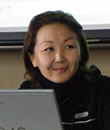 |
Hello, I am Umut Zholdoshova from the Kyrgyz Republic. I received my Master's Degree in Environmental Sciences from the University of Tsukuba in July 2009. I majored in environmental policy and wrote my thesis about the livelihood of local people and their perceptions on protected areas in the Kyrgyz Republic. As a case study for the thesis, I chose the Son-Kol region and conducted field survey and research.
At the University of Tsukuba, I took courses on public policy development, in which I learned much about unequal benefit distribution, social development issues, and dilemmas between development and environment conservation. Compulsory courses also dealt with environmental assessment and environmental policy. Among many other interesting courses in the University of Tsukuba, the most impressed one was the course on environmental ethics. The content of this course was well organized and it made me rethink about the complex relationships of nature and people.
I also participated in courses JICA and the University of Tsukuba organized for international students. These included fieldtrips to Okinawa and Ogasawara islands, where I had unforgettable and joyful experience with my friends. I would like to take this opportunity for expressing my sincere gratitude to my academic supervisors, my friends, the JDS program, and to all Japanese people.
Now I work for the non-governmental organization called RURAL DEVELOPMENT FUND based in Kyrgyzstan as a coordinator of environmental programs. Currently I am busy with fieldtrips in project target sites, which are located in remote rural areas of Kyrgyzstan. The knowledge I acquired in Japan help me effectively undertake my job duties in the fields of community forest management and rural development; and very often I realize that what I learned at the University of Tsukuba has also become valuable asset for my life.








